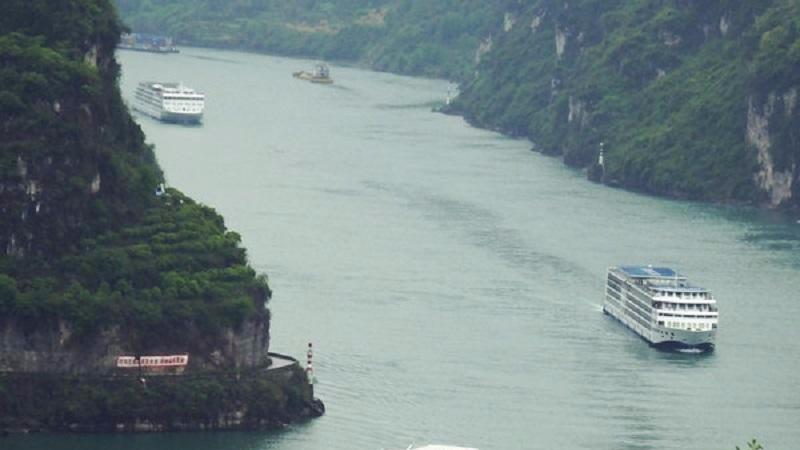 Cruise boats travel along the Three Gorges on the Yangtze River. (Photo by Liu Junfeng, Xiong Bin and Zhu Xiyong / China Daily)
Cruise boats travel along the Three Gorges on the Yangtze River. (Photo by Liu Junfeng, Xiong Bin and Zhu Xiyong / China Daily)
A leading water environment scientist has called for the establishment of an authority in charge of all water governance functions in the Yangtze River basin, saying it would have a "decisive" role in the campaign to conserve Asia's longest river.
Without such a body, which would be able to rein in different regions and government bodies, the "highly systematic" campaign would not be able to achieve complete victory, warned Qu Jiuhui, an academician at the Chinese Academy of Engineering.
Without such a body, which would be able to rein in different regions and government bodies, the "highly systematic" campaign would not be able to achieve complete victory, warned Qu Jiuhui, an academician at the Chinese Academy of Engineering
Qu also chairs an academic committee for the National Joint Research Center for Yangtze River Conservation, which has dispatched teams of experts to each of the 58 major cities in the Yangtze basin to help with local water remediation efforts.
The teams were deployed in late 2018 to conduct front-line and follow-up research, and more than 5,000 experts from some 300 institutes had worked on them by the end of last year, the center said.
READ MORE: Yangtze's water quality improving
The main stream of the Yangtze flows almost 6,400 kilometers across 11 provincial-level regions. Its drainage basin covers a fifth of China's land area and about a third of its population.
Qu said one of his major concerns was whether systematic and sustainable regional solutions could be formulated and integrated into public governance in different cities and across the entire basin, noting a number of hurdles.
Some local governments had resorted to "superficial" measures, such as constructing sewage pipe networks, to treat water bodies, he said, but the effects might only be temporary.
A key task for the teams is to identify the sources of problems originating far from bodies of water. While some problems may be caused by local pollution, others may be the result of agricultural or industrial production in other jurisdictions.
"It's not an easy task," Qu said, because comprehensive surveys and evaluations had to be rolled out to trace all the major potential risks.
He warned, however, that the teams' work would not bear fruit unless the solutions they worked out could be integrated into each city's overall management planning.
"This is where the real challenges in the Yangtze conservation campaign come from," Qu said.
ALSO READ: Reprieve for cormorant fishing on Yangtze
The Changjiang Water Resources Commission is one authority that already has limited oversight of the Yangtze basin, but Qu said that as an agency of the Ministry of Water Resources, it is not powerful enough to address its conservation challenges.
In China, various government bodies are involved in water management, including the ministries of water resources, ecology and environment, and housing and urban-rural development. The Ministry of Housing and Urban-Rural Development, for example, is responsible for sewage treatment.
"All these government bodies have their own monitoring systems," Qu said. "Aside from challenges in integrating the management of the water environment, ecology and resources, there are also difficulties in coordinating different government bodies to contribute their data and resources and roll out policies and measures to help address problems."
Rather than trying to coordinate all those government bodies, Qu said a better option was to create one agency with the power to do all of the work.
Without such an arrangement, he said, the challenges in implementing an overall, systematic remediation plan for the entire Yangtze basin would mount up.
Even if all 58 cities implemented their own solutions effectively, it wouldn't necessarily address all the basin's problems.
"Basin governance needs to coordinate regions in different reaches of the river and on both of its banks," Qu said. "Some of the pollution in certain regions may be caused by external sources."
The difficulties in managing dams, increasingly blamed for damaging the Yangtze's ecological system, are one example of the complexity of basin management and the need for a strong public body that integrates all water governance functions.
Niu Xinqiang, head of the Changjiang Institute of Survey, Planning, Design and Research, said that by the end of 2017, about 24,000 small hydropower stations had been built in the Yangtze River Economic Belt, which covers all but two of the 11 regions the river flows through-with Qinghai province and the Tibet autonomous region being the exceptions-and also includes the provinces of Zhejiang and Guizhou, which boast tributaries of the Yangtze.
"These dams have cut off the passage of migratory fish, resulting in a sharp decrease in quantities of some species," said Niu, a member of the Chinese Academy of Engineering.
Qu said, "In essence … it's about the distribution of interests (among different regions)."
To address problems caused by dams, regions on different reaches of the river needed to be coordinated so their interests were balanced, he said, with one possible solution being the introduction of an eco-compensation system requiring regions that gain from dams to compensate others.
"Moreover, the management of dams is also related to economic modes of different regions," Qu said. "It is very complicated."
The establishment of water authorities that integrated all the water governance functions in a basin had been successful in some countries, he said, with the now disbanded Thames Water Authority in the United Kingdom one example.
"Such a public body will be decisive in ensuring Yangtze conservation efforts are effective and sustainable," Qu said.


